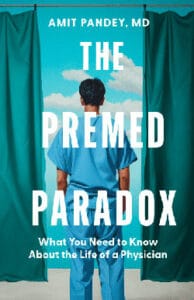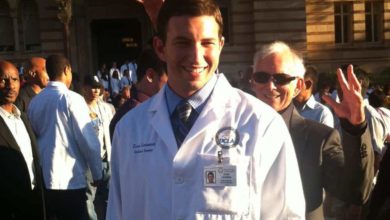Success is a difficult thing to define, as it is much more subjective than objective. Everyone has a different definition of success, whether it be personal, professional, financial, or educational. We all strive for success in our own ways, but no one can define what it means to any one of us—no one other than ourselves, that is. Only we can determine our own goals, priorities, and what constitutes our own version of success.
Medicine: A Goal-Oriented Path
Success is also a tricky entity in that it is elusive. In the case of medical education and training, this is particularly true. The medical profession is highly goal-oriented. It begins with the premed years: achieving a high GPA, securing research experience (or even publications), performing well on the MCAT, and the ultimate prize—medical school acceptance! Next comes med school itself: achieving good grades once again on block exams, securing high scores on the USMLE Step 1 and 2, and ultimately matching into the specialty and program of your choice (fingers crossed!). Then come residency and attending life, with similar performance goals and benchmarks of educational and professional achievement.
In the medical profession it is easy to get caught in a hamster wheel of continually looking toward the next achievement once a particular hurdle has been passed. I myself was very susceptible to this mindset, only briefly savoring the victories and rarely appreciating the process along the way. All too often during training, I immediately looked toward the next achievement that would help me secure another step toward what I perceived as success.
How Do We Shift Our Definition of Success?
But perhaps this is not the best way to approach our own educational and professional journeys, to define our success in the word of medicine. I would challenge these conventional notions of success, which are based on the traditional benchmarks of achievement mentioned above. A more meaningful way of defining success may be in the satisfaction, gratification, and happiness we derive from what we do and how we help those around us.
Appreciate the Process
In order to appreciate these emotions, we must first appreciate the process. That is the first step to creating a more healthy definition of success. To escape from the never-ending pursuit of achievement (the hamster wheel), we must view our journey in medicine itself as the prize we seek, rather some light at the end of a long tunnel. If we appreciate the learning and growth that we are experiencing each day—whether as a premed, med student, resident, or attending—we will start to derive more daily fulfillment than lofty and far-off goals can provide. Rather than seeing the training pathway as a means to an end, if we view it as our chosen career, our life’s work, our opportunity to grow as a person and professional, we will experience much more positivity along the way.

A simple shift in perspective which redefines what is important (the growth and the journey rather than the destination) can significantly alter how you emotionally experience what may otherwise be a rigorous and challenging career.
Focus on Your “Why”
Many of you may have heard the phrase, “find your why in medicine” (or other spheres of life). What this refers to is exploring deeply what your motivations are to pursue a career as a physician. Because it is an inherently demanding career path, it is important that these reasons are sound and well-explored before you embark on the process. I always advise aspiring physicians to first evaluate what is important to you—your priorities, values, and personal/professional goals.
In my recently published book, The Premed Paradox: What You Need to Know About the Life of a Physician, I discuss a stepwise approach to determining if a career as a physician is a good fit for you. Within that discussion, I consider each of the common reasons to pursue a career in medicine and discuss their relative strength as motivations for this lifelong career. Ultimately, your exact reasons are not important as they are different for every individual; what is important is that you explore these reasons and make sure they align with your personal values and long-term goals.
If you have a solid set of values which guide what you want to do with your life’s work, and then you seek the career opportunities which allow you to realize and implement those values, you will very likely find professional satisfaction. These values are internal motivators—things that come from within. Focus on those rather than external motivators such as money, prestige, or outside perspectives on what you should or should not do. It is difficult not to be affected by these external factors to some degree. But try to minimize their influence on your thought process and decision-making. A commitment as important as your life’s work should be intensely personal and based on your own core ideals.
Once you have found your “why,” your life’s work becomes much more meaningful and rewarding. The work changes from a means to an end of achieving “success,” to something you are actively invested in.
Focus on the Patients
One beauty of the practice of medicine is that it inherently involves the service of others. Helping others, finding meaning in bettering the lives of those around you rather than just your own, is a strong way to increase fulfillment and gratification. As a physician, the easiest and most effective way to do this is to focus on your patients. Most (if not all) of us pursue this career with noble motivations to help others and ease suffering. As your career progresses, and as you may experience tough times, lean into this motivation.
Focusing on your patients, being the best physician you can be, and helping as many people as you can each day will provide meaning to your work. Shifting the focus away from personal achievement and toward the service of those in need is a powerful way to redefine success. As you progress on your path through the medical profession and explore your “why’s” as we discussed prior, I encourage you to maintain focus on the patients who need you. This is a powerful why. By making this a central part of your purpose, the daily art of helping others becomes as important as any professional achievement. Your fulfillment will very likely increase as you shift the focus back to what matters most.
Realize the Diversity of Opportunities Within Healthcare
Finally, it is important to understand how diverse the practice of medicine is. From the patients we care for, to the medical providers who pursue this career, to the opportunities present within the field, diversity abounds.

As a young and aspiring premed, the pursuit of a career as a physician often seems very linear in that it is a prescribed educational path from undergrad through med school/residency and into a medical career. But once you get into the field and onto the path, you realize how many different versions of that path there truly are.
There are dozens of medical specialties which differ greatly and offer very unique versions of intellectual stimulation and excitement. There are also different practice settings, from academics (at a university) to community practice (non-teaching institutions) to underserved areas and global health, and so on. Then come opportunities for innovation such as research, medical devices/technology, and pharmaceuticals, to name a few; leadership such as medical administration and public policy; teaching with medical students and residents; and the list goes on. The amount of unique paths available to each student who begins medical school is almost unimaginable. The opportunities are endless in medicine. Along your journey, you can keep an open mind and navigate the path as you go. You should not feel that you need to have it all figured out from day one.
Once again, the career (and success within it) is a process and not a means to a final destination. Enjoy the process. There will be twists and turns along the way. This excitement, viewing your career as an active growth process, will help redefine how you perceive and achieve your own success within the world of healthcare.
Read More in The Premed Paradox
As an internal medicine hospitalist, I am passionate about helping future generations of doctors navigate this complex career to find happiness and fulfillment on their own path. This passion inspired me to write a book which I recent published, entitled The Premed Paradox: What You Need to Know About the Life of a Physician. It is a comprehensive and detailed overview of the life experience of a doctor, all the way from the premed years, through medical school and residency, to life as an attending physician. This book is my honest and sincere effort to pass on the knowledge and experience I have gained over years of work in the medical field. It is a deep dive into the key insights and perspectives that I wish I had before I began.

The book contains a detailed overview of the practical nuts and bolts of the physician experience, acting as a roadmap for future physicians; but it is also a candid reflection on the experience of medical practice—the sights, sounds, feelings, and emotions that you will likely have along the way. I am confident that it will help you on your journey to becoming a physician.
Read more on Dr. Pandey’s website or purchase The Premed Paradox on Amazon.
Best of luck to you as you pursue your own version of success in the medical profession!
Help Applying to Medical School
We’ve given you a lot to think about when it comes to making a decision about medical degrees while applying to medical school. But we’re also here to offer more help.
Schedule a free 15-minute consultation with our friends at MedSchoolCoach to learn how they can help boost your chances of success getting into medical school.



